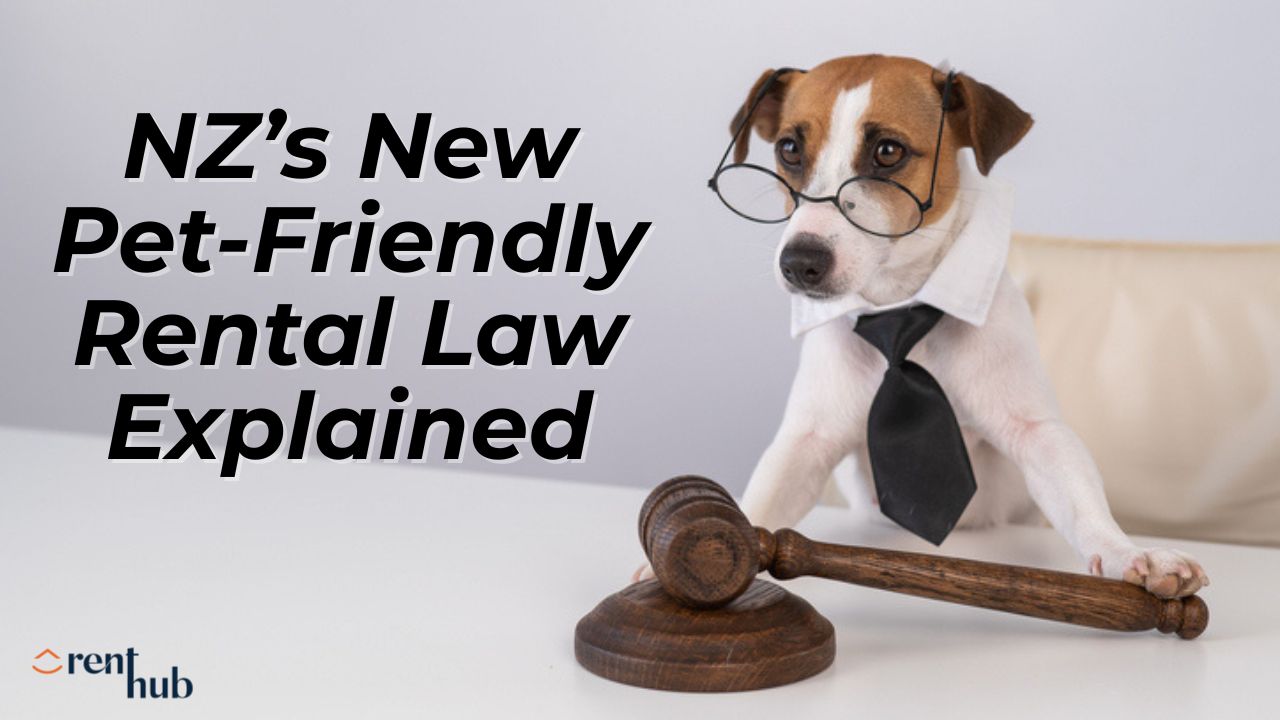What Landlords and Tenants Need to Know
From 1 December 2025, new rules under the Residential Tenancies Amendment Act 2024 will change the way pets are managed in rental homes across New Zealand.
For a long time, renters with pets have found it tough to secure a place to live, thanks to blanket “no pets” policies. The new law is designed to make things fairer. It gives responsible tenants a genuine chance to have pets, while still making sure landlords can protect their properties.
What Counts as a Pet
In practice, a pet is generally considered an animal kept for companionship or emotional support, rather than for work or food.
Landlords and tenants are encouraged to:
- Discuss and agree on what qualifies as a pet for their tenancy.
- Record this clearly in the tenancy agreement or consent form.
If a disagreement arises, for example, whether a chicken or goldfish is considered a pet, the Tenancy Tribunal can decide based on the facts presented.
What Isn’t a Pet
The only animals specifically excluded from the new rules are disability assist dogs, as defined under the Dog Control Act 1996. These include dogs trained or in training and certified by approved organisations under Schedule 5 of that Act.
Other service or therapy animals, such as emotional support dogs, will not have automatic exemption and will fall under the new pet consent framework.
Requesting Pet Consent
Under the new pet rules for rentals, tenants can request permission to keep a pet at any time during their tenancy.
Landlords can only refuse if they have reasonable grounds and must:
- Respond within 21 days of receiving the request.
- Request further information if needed, but still within that 21-day period.
Reasonable Conditions When Consenting
If a landlord agrees to a pet, they may set reasonable conditions, such as:
- Requiring the pet to be restrained during inspections or maintenance visits.
- Asking for carpets to be professionally cleaned at the end of the tenancy.
- Requesting a pet bond (up to two weeks’ rent).
These conditions must be fair and relevant to the property or pet type.
When a Landlord Can Say No
Landlords may decline a request if they can show reasonable grounds, for example:
- The property is unsuitable (no fencing, limited space).
- Body corporate or council bylaws prohibit pets.
- The pet’s breed, size, or behaviour poses a risk.
- The tenant has previously breached pet-related conditions.
Blanket bans will no longer be valid. Every refusal must be specific, justified, and reasonable.
Pet Bonds
Landlords can now request a separate pet bond of up to two weeks’ rent, in addition to the standard bond.
Key points:
- Both bonds must be recorded in the tenancy agreement.
- Both must be lodged with Tenancy Services.
- The pet bond must be adjusted if rent increases.
If a tenant removes a pet and does not replace it, they may apply for a refund of the pet bond.
Pet-Related Damage
From 1 December 2025, tenants will be fully liable for pet-related damage beyond fair wear and tear.
This includes damage caused directly by a pet or indirectly through keeping the pet. For instance, if an aquarium leaks and damages flooring.
For existing tenancies, any damage caused before this date should be recorded promptly. After the commencement date, all new pet-related damage falls under the new liability rules.
Existing Pets
If a tenant already has a lawfully approved pet before the new rules start:
- No new consent is required.
- No pet bond can be added retrospectively.
The new consent process and pet bond rules apply only to new pets or new tenancies from 1 December 2025 onwards.
Breaches and Penalties
If either party breaches the new rules, penalties can apply:
| Breach | Maximum Fine / Exemplary Damages |
| Tenant keeps a pet without consent | $750 |
| Landlord refuses a pet without reasonable grounds | $1,500 |
| Landlord fails to respond to a request within 21 days | $1,500 |
| Landlord issues a retaliatory notice after a request | $6,500 |
Guidance for Tenants
- Always submit requests in writing after the new rules take effect.
- Include details such as breed, age, temperament, and care arrangements.
- Check whether your property manager has a pet application form.
- Expect reasonable conditions and possibly a pet bond.
- Keep your pet and the property in good condition to avoid additional costs.
Guidance for Landlords
- Update tenancy agreement templates to include a pet consent clause.
- Prepare to respond to pet requests within 21 days.
- Review your insurance policy to confirm pet-related coverage.
- Define clear conditions for consent. This could include: number, type, cleaning expectations.
- Conduct regular inspections and address issues promptly.
Consider whether your property is pet-friendly. For example: secure fencing and durable flooring can attract reliable, long-term tenants.
Summary
From December 2025, New Zealand’s rental pet rules move toward balance. This helps to protect landlords’ assets while giving responsible tenants a fair chance to live with their animals.
Clear communication, well-documented agreements, and mutual respect will make the transition smooth for everyone involved.



